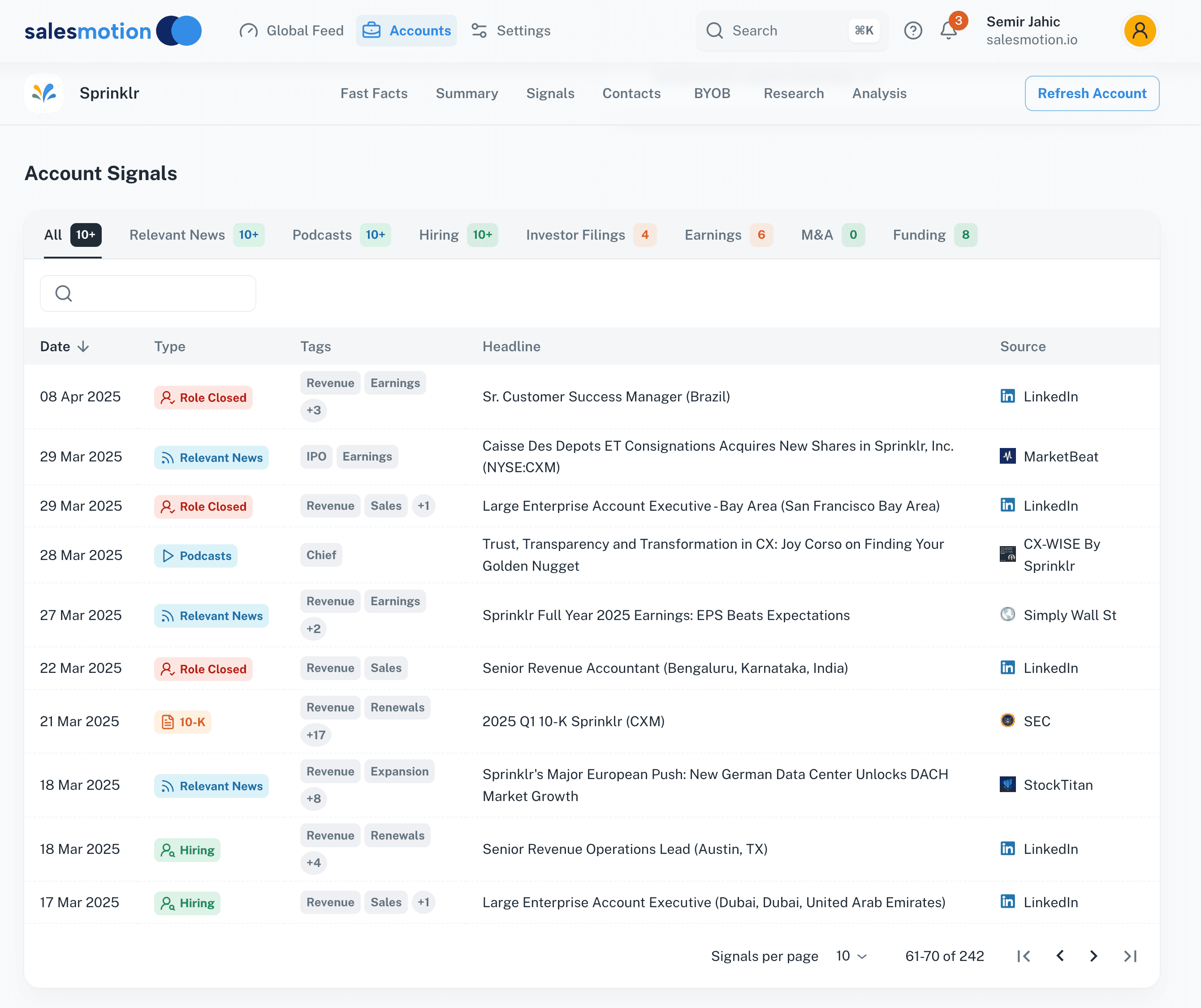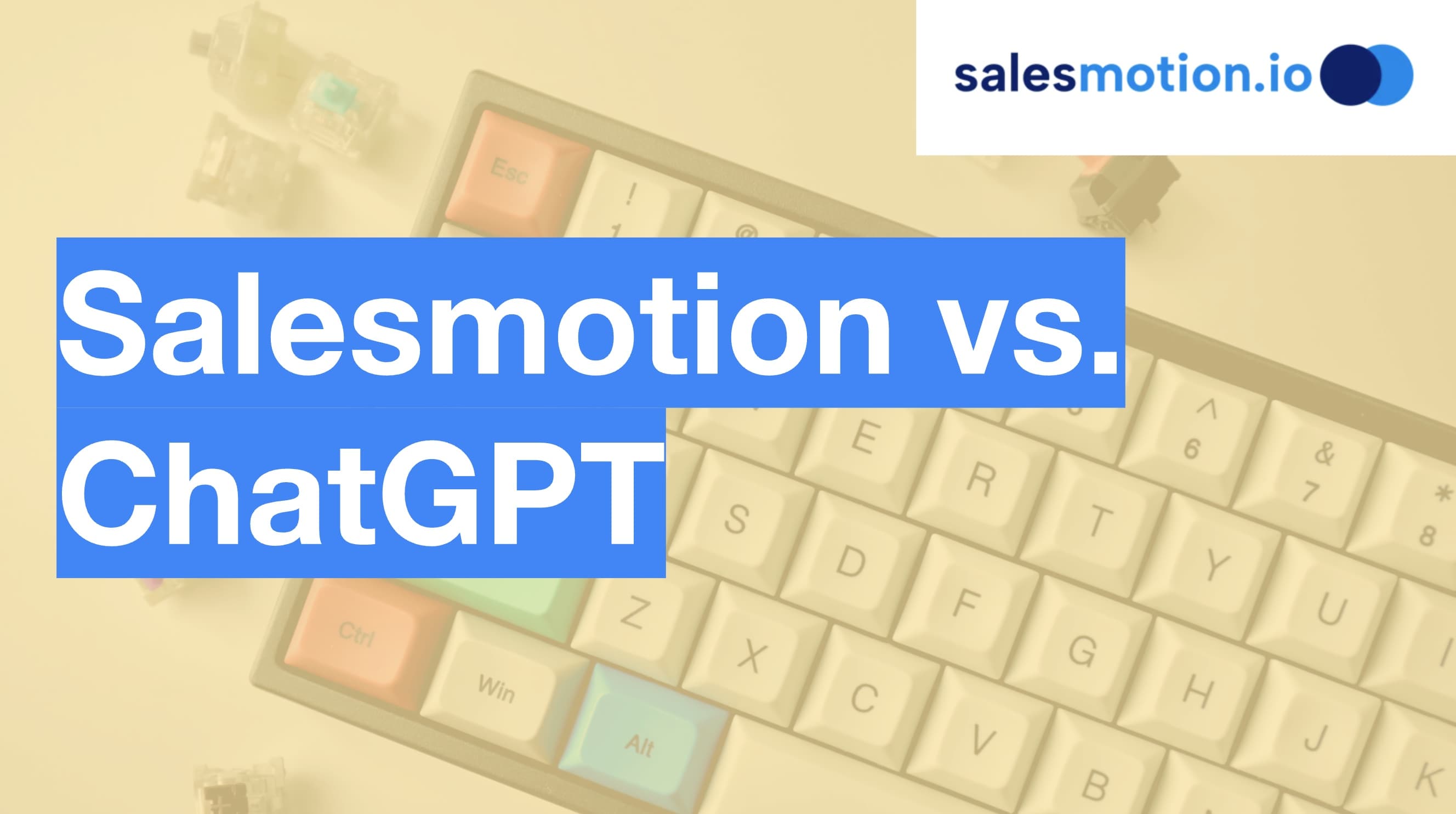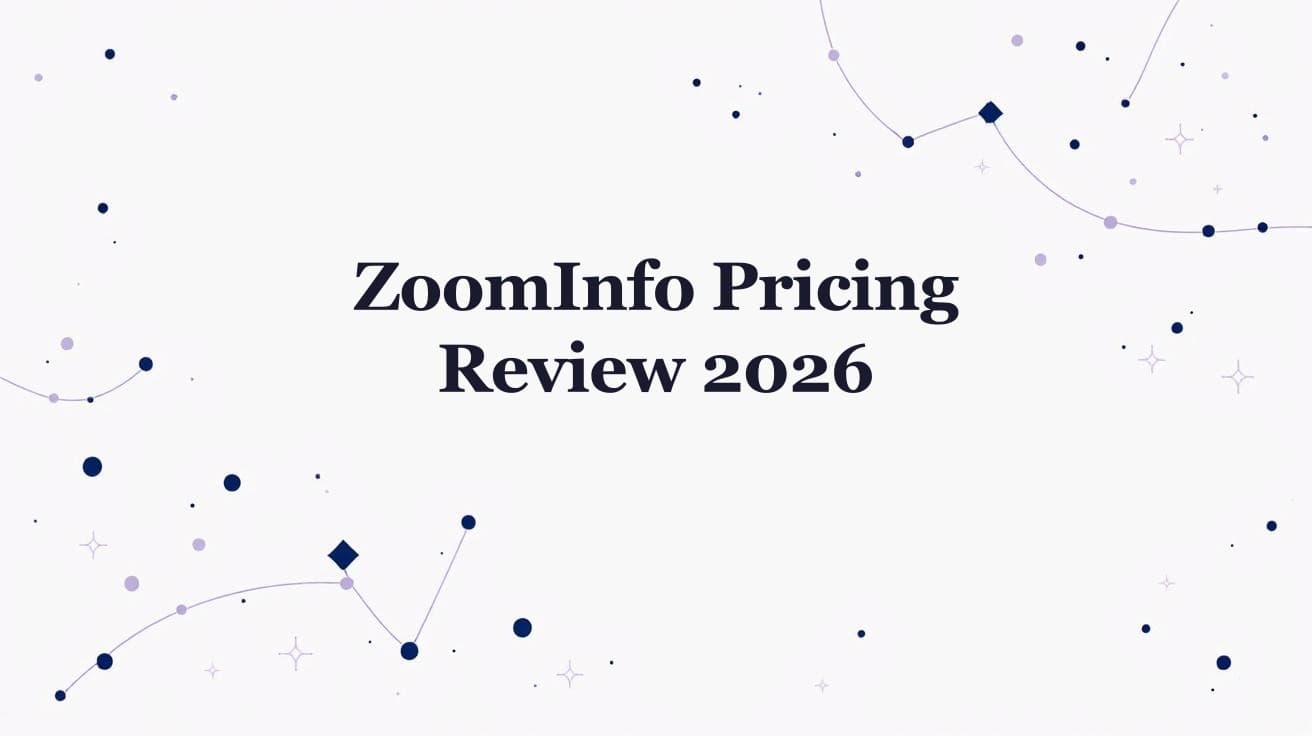Salesmotion vs. ChatGPT: The Definitive Guide for Sales Teams in 2025
The big question we hear so often:
“Why not just use ChatGPT for sales research and outreach?”
See the product in action
Take a self-guided tour of the Salesmotion platform.
TL;DR – Salesmotion vs. ChatGPT for Sales Teams
ChatGPT is powerful for ad-hoc research, content drafting, and answering one-off questions, but it wasn’t built for territory-scale, signal-driven B2B sales. It requires manual prompts, is limited by its knowledge cutoff (even with web search), and lacks workflow integration, scoring, or automatic alerts.
Salesmotion automates 24/7 monitoring of all your accounts, surfaces real-time buying signals and triggers, delivers sales-ready summaries and prioritization in your CRM, and never requires prompt engineering. For teams managing dozens to thousands of accounts, Salesmotion consistently saves time, uncovers more opportunities, and drives measurable sales results.
-
ChatGPT: Great for solo reps, content, or one-off questions.
-
Salesmotion: Built for teams who want to win more pipeline with less manual research—automatically.
The answer isn’t about hype or fear of missing out. It’s about productivity, accuracy, and results. Here’s the deep dive—fair, data-backed, and packed with real user experience on how Salesmotion and ChatGPT compare.
“The moment we turned on Salesmotion, it became essential. No more hours on LinkedIn or Google to figure out who we're talking to. It's just there, served up to you, so it's always 'go time.'”
Adam Wainwright
Head of Revenue, Cacheflow
Understanding the Productivity Crisis in Sales
Today’s B2B sales teams are stretched thin:
- Sales professionals spend only ~30% of their time actually selling; the rest is lost to research, admin, and data entry.[1]
- 6.5 weeks per year lost per rep to manual administrative tasks.[3]
- 20% of a rep’s week is consumed by prospect research.[4]
- CRMs still require 30+ minutes daily of manual updating for most reps.
This isn't just a drag on cost—it's the hidden killer of pipeline generation and deal velocity. Sales teams are turning to AI, but the difference between a general-purpose chatbot like ChatGPT and a specialized sales intelligence engine like Salesmotion is big.
ChatGPT: Incredible Versatility, Real Limitations for Sales
Let’s be clear: ChatGPT is a marvel for brainstorming, content generation, and ad-hoc research. But when applied to modern B2B sales, four major limitations consistently hold teams back:
1. Knowledge Cutoff & Data Freshness
ChatGPT’s knowledge is limited to 2021–2023 (depending on version). This means it can’t surface real-time buying signals, new leadership changes, or emerging market moves unless you feed them in manually. Even web-search enabled GPT tools fall short, more on that later.[5]
2. Manual Prompting, No Automation
Every interaction requires a crafted prompt. For a territory of 100+ accounts, this quickly becomes unmanageable. You’ll spend hours typing, tweaking, and fact-checking. This is not what sales reps should be focused on with their precious productive time.[8]
3. AI Hallucinations and Accuracy Risks
ChatGPT sometimes hallucinates facts—even inventing quotes or events that never happened. For sales teams, this can mean sharing inaccurate data with prospects, which damages trust and credibility.[12]
4. No Sales Context or Workflow Integration
ChatGPT doesn’t know your ICP, value props, or territory structure. There’s no account scoring, prioritization, or pipeline view. There are no CRM push notifications, no signal alerts, and no ready-to-send summaries.
 Salesmotion provides structured account context and workflow integration that ChatGPT lacks.
Salesmotion provides structured account context and workflow integration that ChatGPT lacks.
See Salesmotion on a real account
Book a 15-minute demo and see how your team saves hours on account research.
What the User Experience Feels Like: ChatGPT vs. Salesmotion
Using ChatGPT (even with Web Search) as a Sales Rep
1. Start with a blank slate.
Open a new browser tab. Copy-paste account names, earnings reports, news headlines, or LinkedIn profiles into ChatGPT—one at a time.
2. Write your prompt:
(“Summarize the last 10-Q for [Company]. Find any new exec hires, strategy shifts, or market changes. Look for recent news and funding announcements.”)
3. Wait for the response.
If you use web search, ChatGPT will try to summarize some pages, but you still have to:
4. Check the links it found
Click through to verify, and manually dig for real triggers or context.
Fact-check for accuracy (watch out for hallucinations or outdated content).
5. Repeat this for every insight you need.
Ultimately, searching manually might have been quicker at this stage.
6. Repeat for every account—daily, weekly, or whenever you remember.
No territory-wide monitoring. No proactive signals. No automatic alerts. No way to know if you missed something unless you manually check each account again.
7. No prioritization, no scoring, no tailored sales context.
ChatGPT doesn’t know which signals map to your product or ICP, doesn’t score or rank accounts, and won’t push insights into your CRM or workflow.
8 Manual organization required.
Your chat window becomes a log of disconnected research. You’ll need to organize, copy-paste, and update your CRM by hand.
The real-world result?
For one-off research or writing an email, ChatGPT (even with web search) is helpful.
But for managing a book of 50, 100, or 1,000 accounts, it’s manual, repetitive, and easy to miss key opportunities—especially if you forget to check or prompt.
Using Salesmotion as a Sales Rep
1. Quick Setup
Connect your territory or upload your account list once—Salesmotion does the rest automatically.
2. Proactive Monitoring
Monitors 1,000+ data sources 24/7 for every account—SEC filings, earnings calls, news, hiring, leadership changes, product launches, and more.
3. Alerts
Sends instant, prioritized alerts when a buying signal or trigger event appears—so you’re always first to act.
4. Ready-to-Go
Delivers a ready-to-use summary, POV, and value mapping for each account, tailored to your solution and linked to original sources—never hallucinated.
5. Account Scoring
Scores and prioritizes accounts based on your value props, ICP, and campaign focus—so you know exactly where to spend your time.
6. Integrated
Integrated into your CRM, Slack, or workflow. Insights, talking points, and account overviews appear where you already work—no copy-paste, no tab switching.
7. Prompt-free
Zero prompt engineering or manual research. Reps just log in, review what matters, and start selling.
The real-world result?
Research time drops by up to 60%.
You never miss a trigger, and you’re always focused on the accounts that matter.
Teams report 50%+ more meetings booked and uncovering net-new pipeline, all while avoiding the manual grind.
ChatGPT is powerful for ad-hoc research and content generation, but if you want to operate at territory scale, never miss a signal, and have everything pushed to you—Salesmotion is the only solution built for high-performing sales teams.
Knowledge Cutoff, Web Search, and Why Sales Teams Still Need More
The “outdated data” limitation in ChatGPT is real—but web search isn’t a silver bullet for sales teams. Here’s why:
1. Knowledge Cutoff: The Baseline Limitation
Standard ChatGPT models (even GPT-4o) are only as current as their last training run—often a year or more behind. That means out-of-the-box, ChatGPT won’t know about the latest leadership hires, product launches, funding events, or strategy shifts. For revenue teams who live and die by timing, this is a major drawback.
2. Web Search: Helpful, But Not Built for B2B Sales Execution
OpenAI, Microsoft Copilot, and other AI assistants have added web search or “Browse with Bing” capabilities, which means you can now ask ChatGPT to look up recent information. This addresses the data cutoff—but only for the specific question you ask, about one company at a time.
In practice:
-
- You have to manually prompt, research, and parse each result yourself.
- You get a mixture of links, summaries, and sometimes hallucinated facts, with no automatic signal scoring or prioritization.
- There’s no territory-wide monitoring—no way to know which of your 100+ accounts just made the news unless you run 100+ searches and read them all.
Why Salesmotion Is Still in a Different League
Salesmotion was built to solve the problems that web search and manual research can’t:
-
Continuous, automated monitoring of every account on your list, 24/7.
-
Instant alerts and account rundowns the moment something important happens—no prompt needed.
-
Tailored, sales-ready POVs, talk tracks, and value mapping tied directly to your product and ICP.
-
Integrated into your CRM and workflow—so every rep gets what they need, where they work.
-
All insights are linked to original sources, with no risk of hallucination or missed context.

Bottom line
Web search in ChatGPT helps you answer “what’s new at Acme Corp?”—but only if you ask, only one account at a time, and only if you know exactly what to look for.
Salesmotion answers “what’s happening in my entire territory, right now, and why does it matter?”—automatically, every day, for every seller.
Head-to-Head Feature Comparison
| Capability | ChatGPT | Salesmotion |
|---|---|---|
| Account Monitoring | Manual prompting per account | Automated, 24/7 across 1,000+ sources |
| Data Freshness | Cutoff at 2021–2023 | Real-time, up-to-date |
| Signal Alerts | None | Proactive, prioritized, and customizable |
| Account Scoring & Prioritization | None—gut feel/manual only | Signal-based, real-time |
| POVs, SWOTs, Messaging | Manual prompts, needs fact-checking | Auto-generated, sales-ready, tailored |
| Source Transparency | Rare, must gather yourself | Every insight backed by references |
| Workflow Integration | Standalone, copy/paste only | Native CRM, Slack, email, and more |
| Consistency & Reliability | Depends on prompt skill, inconsistent | Standardized, sales-optimized, always-on |
| Territory Scale | One account at a time, very manual | Entire book of business, at once |
Deeper Dives: Where the Gap Gets Real
1. Real-Time Signals, Not Old Data
ChatGPT's data is often months—or years—out of date. If your prospect raised a new funding round yesterday, hired a new CIO last week, or announced layoffs this morning, you won't know unless you tell ChatGPT first.
Salesmotion tracks, scores, and alerts you to these buying signals automatically—often before your competitors spot them.
2. Automation at Scale vs. Manual, Account-by-Account Effort
ChatGPT can’t “watch” your territory or push insights without a prompt. Salesmotion’s agents do the work continuously, surfacing new opportunities (and threats) across your full account list—while you focus on closing.
3. Trusted, Actionable Intelligence
Every Salesmotion summary includes source links, executive quotes, and explicit triggers. No hallucinated facts, no “maybe this happened.” When you walk into a meeting, you have the same data the buyer does—if not better.
4. Built for Sales, Not for Prompt Engineers
With Salesmotion, reps spend zero time crafting prompts, training models, or cleaning up output. Instead, they log in, see who’s signaling, why, and what to say—right in the platforms they already use.
Cost-Benefit Analysis: Productivity and ROI
The True Cost of Manual Research
1. For a 10-person team using ChatGPT manually: 80 hours per week lost to research.
2. That’s 1.5 full-time reps per year in lost productivity.
3. Pipeline and win rates suffer as a result.
Automated Intelligence ROI
- 60% reduction in prep time (Cacheflow case study)
- 3x increase in deal sizes
- 50%+ increase in meetings booked (Incredible Health)
- 6 hours/week saved per rep on research (Guild Education)
- 25% year-over-year revenue growth for teams using account intelligence
ChatGPT: Great for quick questions and email drafts, but there’s no push to your CRM, no account history, and no workflow automation. Everything is up to the user.
Salesmotion: Insights land where you sell. Salesmotion integrates with Salesforce, HubSpot, and other tools—pushing signals, notes, and summaries to the exact fields and dashboards your team uses every day.
Feature-by-Feature Table
| Capability | ChatGPT Approach | Salesmotion Advantage |
|---|---|---|
| Account Monitoring | Manual prompting required | 24/7 automated monitoring across 1,000+ sources |
| Data Freshness | Limited to training cutoff | Real-time updates and alerts |
| Signal Detection | User must know what to search for | Proactively identifies buying signals |
| Workflow Integration | Standalone tool, copy/paste to CRM | Deep CRM and workflow integration |
| Consistency | Variable, depends on prompts | Standardized, optimized for sales |
| Scalability | Linear time per account | Full territory, exponential coverage |
When Is ChatGPT Actually the Better Tool?
- Solo rep or founder researching a small number of accounts
- Drafting custom copy or creative content from a blank page
- One-off brainstorming and learning new topics
- Cost is the main constraint and you have the time to prompt, research, and verify
But for teams managing a book of 20, 50, 100, or 1,000 accounts—where every signal can mean pipeline—the manual approach simply can’t keep up.
The Bottom Line: Compounding Value in a Noisy Market
ChatGPT has raised the bar for what’s possible with generative AI in sales. But the true competitive advantage comes from doing the right things, at the right time, with territory-wide coverage and zero guesswork.Salesmotion delivers what sales teams actually need:
-
- Account coverage that never sleeps
- Signals surfaced in real time, not after the fact
- POVs, messaging, and value mapping built-in, not DIY
- Time back to sell, not research
- Full source transparency, not guesswork
- Integration with the tools you already use
For ambitious revenue teams, the choice isn't "AI or no AI"—it's whether your AI works for you, or you work for it. Ready to unlock signal-driven selling?
Key Takeaways
- ChatGPT is a powerful general-purpose AI tool for brainstorming and content generation, but it lacks the real-time data, sales context, and workflow integration that B2B revenue teams need at scale.
- The four critical limitations of ChatGPT for sales are its knowledge cutoff, manual prompting requirements, hallucination risk, and complete absence of CRM integration or account scoring.
- Salesmotion is purpose-built for sales teams, providing always-on monitoring of 1,000+ sources, automatic signal detection, and ready-to-use account briefs without any manual prompting.
- For teams managing territories of 20 or more accounts, the manual research approach with ChatGPT cannot keep pace with a specialized platform that provides territory-wide coverage and real-time alerts.
- ChatGPT remains the better choice for solo reps researching a small number of accounts, drafting creative content, or brainstorming when cost is the primary constraint.
References
Frequently Asked Questions
1. Can't ChatGPT do what Salesmotion does if I use web search or good prompts?
Not at scale. Even with web search, ChatGPT only answers questions you specifically ask, about one account at a time. There’s no territory-wide monitoring, automated scoring, or real-time alerts. Salesmotion continuously scans 1,000+ sources, automatically alerts you to triggers, and delivers prioritized, sales-ready insights—no prompting required.
2. What data sources does Salesmotion monitor?
Salesmotion tracks SEC filings, earnings calls, news articles, funding announcements, job postings, leadership changes, podcasts, and more—over 1,000 public data sources—covering both public and private companies.
3. How does Salesmotion help my team save time?
Salesmotion eliminates manual research and prompt-writing. All signals, summaries, and talking points are pushed to your CRM or workflow, reducing research time by up to 60% and freeing reps to focus on selling, not searching.
4. What about hallucinations and accuracy?
Salesmotion never invents facts. Every summary is sourced and linked to original data (e.g., earnings reports, news), with zero hallucinated content. ChatGPT, on the other hand, sometimes generates information that isn’t accurate unless you rigorously fact-check.
5. Can I customize what Salesmotion monitors or prioritizes?
Yes. Salesmotion lets you define your ICP, product value props, and campaign focus—so the signals and summaries are tailored to your specific go-to-market motion.
6. How does Salesmotion integrate with my existing sales stack?
Salesmotion integrates natively with Salesforce, HubSpot, and other leading CRMs, as well as Slack and email. Insights, alerts, and summaries appear where your team already works—no copy-paste or context-switching.
7. When is ChatGPT actually a better choice?
If you’re a solo founder or SDR managing just a handful of accounts, or you mainly need creative content and ad-hoc research, ChatGPT is a cost-effective option. For territory-wide monitoring, pipeline prioritization, and always-on alerts, Salesmotion is purpose-built and works better.



